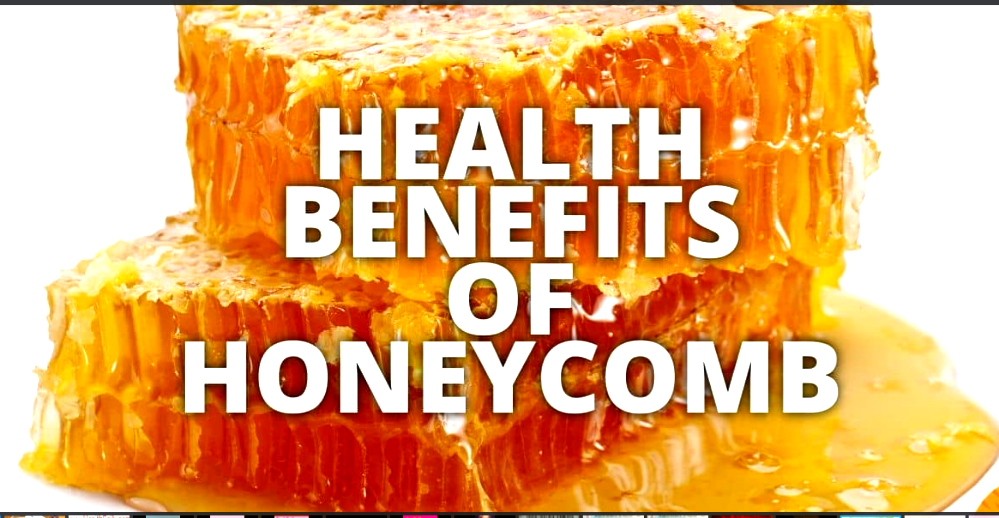What is meant by Honeycomb?
A honeycomb is a structure made by honeybees out of beeswax to store their food (honey), pollen, and their eggs.
Honeycomb consists of a series of hexagonal cells arranged together in a pattern and makes an important part of the honey-making process for bees.
Bees store their collected nectar from flowers in their honeycomb where they later convert it into honey with the aid of enzymatic activities and evaporation for their colony.
Honeycombs are used by bees as shelter, and to raise their young.
Queen bees lay eggs in the cells, which then hatch into larvae, and the larvae are fed a mixture of pollen and honey by worker bees until they develop into adult bees.
What are the Health Benefits of a Honeycomb?
Honeycomb is the natural beeswax structure used by bees to store honey, and they have been used by humans for thousands of years as a source of honey and beeswax.
Besides honey itself, can you use honeycomb in tea, is honeycomb healthy or even better than honey?
There are some health benefits of honeycomb and possible side effects.
Honeycomb has high Nutritional value
Honeycomb is a superfood and rich in vitamins and minerals, including vitamins A, B, C, D, and E, calcium, iron, zinc, and magnesium.
Eating raw honeycomb means you’re eating the best unprocessed and undiluted honey in its natural state.
You can get propolis and royal jelly and other goodies in it directly from the hive.
Also, it is a good source of carbohydrates and contains antioxidants that can help protect against cellular damage.
For Allergy relief
Honeycomb may also provide some relief for seasonal allergies. Eating locally produced honeycomb can expose the body to small amounts of pollen, which can help build up immunity to allergens over time.
It boosts your Immune system
Honeycomb contains propolis, a substance that bees use to protect their hives from bacteria and viruses.
Propolis contains antimicrobial, antioxidants, and antifungal agents that can wade off bacteria causing infections, reduce inflammation, also boost your immune system.
Honeycomb is good for your teeth
Honeycomb is anti-inflammatory and antimicrobial, therefore eating it can help clean debris and plaque from your teeth and gum, disinfect your mouth, and improve your oral health.
Chewing honeycomb can also reduce the acid produced in your mouth, thereby, reducing the rate mouth bacteria produce dextran, and form plaque.
Also, chewing beeswax helps clear your airway and is a much healthier cough drop or chewing gum alternative.
It improves your gut health
Honeycomb is a natural prebiotic and a rich source of vitamins, and fiber that can help improve digestion and relieve digestive problems, such as constipation and acid reflux.
Honeycomb contains more nutrients, is more concentrated, and is better than honey in improving health.
Plus, it’s edible, digestible, and can be used as sweetener in foods and drinks.
Honeycomb may be good for weight loss
Beeswax contains healthy carbs, high in sugar and long-chain fatty acid, but low in calories.
While consuming honeycomb every day can still spike your sugar levels despite its low glycaemic index, it also contains probiotics that can reduce your appetite, and improve nutrient absorption, thereby causing weight loss.
It has anti-aging effects
Honey is commonly used to nourish skin and hair, and it’s found in many cosmetic products used on both skin and hair.
Honeycomb has moisturizing and antibacterial properties, and can be used topically to soothe and hydrate dry, irritated skin.
It supports liver and heart functioning
Honeycomb can help detoxify your body, and clean bile, thereby improving liver functions.
Phenolic acids and flavonoids in beeswax can help reduce low-density lipoprotein (LDL cholesterol) and increase HDL cholesterol while preventing against the build-up of fats in the arteries.
This help to prevent heart-related diseases such as stroke, and improve your cardiovascular health.
Conclusion
Honeycomb is considered safe and nutritious to eat, but you should be eaten in moderation for easy digestion.
Beeswax is a good alternative to sweeteners and can help curb sugar cravings, and offer numerous health benefits such as honey or more.
However, people with bee allergies should avoid honeycomb and other bee products or talk to their doctor before adding them to their diet.
